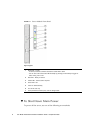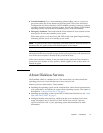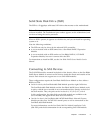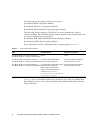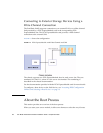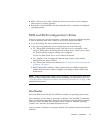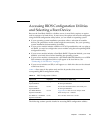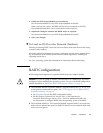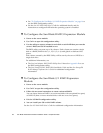
12 Sun Blade X6450 Server Module Installation Guide • September 2008
Bootloaders are commonly used for two types of selections:
■ Booting different operating systems. For example, if you have installed the
Solaris and Linux operating systems on different drives, or on partitions of the
same drive, you can use the bootloader to select between them.
■ Booting the same operating system with different parameters. For example,
with the Solaris OS, you can configure one selection to display console output on
the serial port, and the other to display console output on the VGA output.
Note – This is the currently supported method of switching the console output
between the serial management port and the VGA port.
After the bootloader exits, the server module continues to boot from the selection
you have made.
The bootloader you see depends on the type of operating system booted by the
BIOS:
■ The Solaris and Linux operating systems use the Grand Unified Bootloader
(GRUB).
■ The Windows operating system uses a proprietary bootloader.
For example, in a system with the Solaris operating system and the Windows
operating system, if the BIOS boots the device containing the Solaris operating
system, the GRUB bootloader appears. However, the GRUB can be configured to
include a selection that boots a Windows operating system.
Note – Bootloaders are highly configurable. The choices are determined by local
configuration. See your network administrator for additional information.
GRUB
When the GRUB bootloader opens, it displays a menu of selections.
■ To make a selection, use the arrow keys to highlight your selection, then press the
Enter key.
■ To accept the default selection, do nothing. GRUB will time out and boot the
default.
Windows Bootloader
The Windows bootloader performs the same basic function as GRUB. For more
details, see your Windows operating system documentation.



